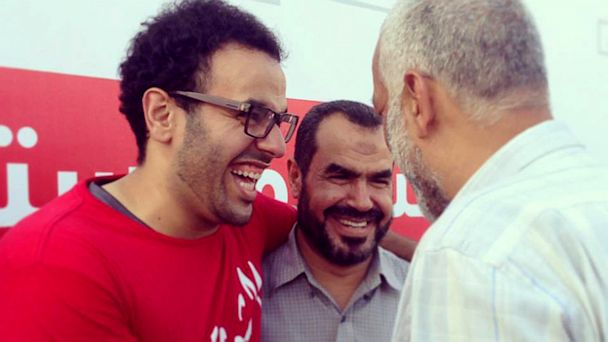Wounded American's View of Egypt's Bloodshed

Mohamed Soltan, left, with his father and friend, has been at the heart of the protests in Cairo. Courtesy Mohamed Soltan
Mohamed Soltan, who graduated from Ohio State University last year, received a frighteningly up close view of this week's massacre of Egypt's protesters.
An Egyptian-American, Soltan, 25, joined the Anti-Coup Alliance after former president Mohamed Morsi was ousted. Soltan became one of the main liaisons between the Muslim Brotherhood, the Anti-Coup Alliance and foreign press and ABC News saw him in action during a visit to Raba'a Al Adeyawa two weeks ago. His iPhone 5 always in hand, he moved seamlessly between meetings with former Brotherhood ministers to strategy sessions with the Anti-Coup social media team.
He emerged from Wednesday's violence admittedly shaken, but determined and sporting a cast on his left arm from a bullet wound.
After just three hours of sleep, Soltan woke up Thursday morning and started crying. He cried for an hour without stopping, he said.
"I couldn't help myself. I just sobbed. It just all came together," he said. "It was an unimaginable nightmare."
Soltan provided ABC News with a detailed replay of the chaos and terror during the government's bloody crackdown on protesters.
For weeks the interim government, headed by interim president Adly Mansour, had threatened to clear the protests, and yet Wednesday's dispersal took the protesters by surprise.
"If we had known they were actually going to move in, and be that vicious, we would have made different decisions," Soltan said. "There's no way we thought they were going to kill that many people."
According to his Twitter timeline, he began tweeting around 7 a.m. as security forces began to arrive at Raba'a Al Adewaya, the largest Morsi sit-in in Cairo's Nasr City.
"They first came with those bulldozers. Those oversized bulldozers," Soltan recounted. "That's the first thing we saw. Then tear gas."
Heavy tear gas even seeping through this mask as heavy fire continues from both sides of Yousef Abbas street pic.twitter.com/JE1Q0fb4LH
- Mohamed Soltan (@soltanlife) August 14, 2013
As the bulldozers rolled through the first line of barriers, Soltan watched people climb onto the bulldozers before being "blasted off" by armed men on foot. "Literally dropping like flies," Soltan said he saw five people shot within the first five minutes.
As security forces pressed forward, Soltan retreated to stage at the center of the sit-in. Standing next to Brotherhood leaders and journalists, they could hear live bullets nearby as they struggled with the barrage of tear gas.
They are burning this place down with no regard for human life pic.twitter.com/vyF3sXc4HL
- Mohamed Soltan (@soltanlife) August 14, 2013
"We could hear the live fire, but no live bullets came near the stage at first," Soltan said.
Amid the chaos, Brotherhood leader Mohamed El Beltagy turned to Soltan to say they needed to get in touch with foreign media. "We needed to do something right then before something else happened he said," according to Soltan.
Beltagy is next to me asking any major news agency to contact us on Rabaa stage
- Mohamed Soltan (@soltanlife) August 14, 2013
"But then something else happened," he said.
Camera man just got shot on Stage! We are being shot at on Rabaa stage
- Mohamed Soltan (@soltanlife) August 14, 2013
And moments later, another shot rang out.
Second camera man to be shot on Rabaa stage right now
- Mohamed Soltan (@soltanlife) August 14, 2013
Backup camera mans helmet pic.twitter.com/z4cv9Y5Q28
- Mohamed Soltan (@soltanlife) August 14, 2013
By this time, the stage was panicking and Soltan was on the phone with Al Jazeera English about to go live. As he bent over to plug his phone into the generator, a bullet whizzed above his head, puncturing the wall behind him.
"I looked up and the bullet hole was exactly the height my head had been." He dropped the phone and moments later, he was shot in the arm.
I was shot in the left arm w/live amo when I was on #Rabaa stage by a sniper while talking 2 JSC. Too many sever cases here & can't leave
- Mohamed Soltan (@soltanlife) August 14, 2013
"It just felt like somebody really, really strong had punched me."
As the hours ticked by, and the stacks of bodies in the field hospital grew taller, Soltan found himself trapped in a tiny room with fellow Anti-Coup volunteers and Brotherhood leaders.
"They were ready to burn the place down and at that point, Beltagy looked at everyone in this room, and said let's leave and we'll regroup."
Shortly thereafter, Egypt state TV showed an orderly line of men marching out of the camp.
"Raba'a was like home," Soltan lamented. "I felt a sense of security, a sense of safety there."
Soltan added, "It was weird, I didn't get scared. I'm there for my country. I'm there for my country's freedom. There's no more honorable cause to be there."